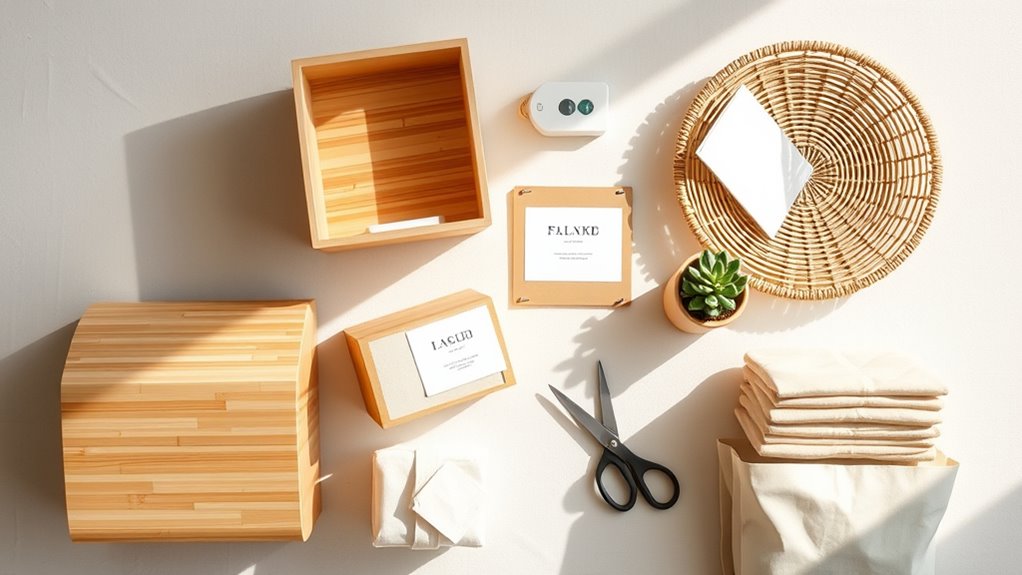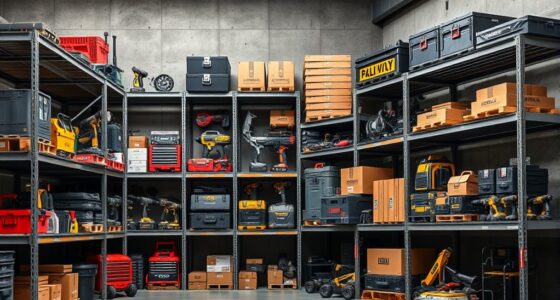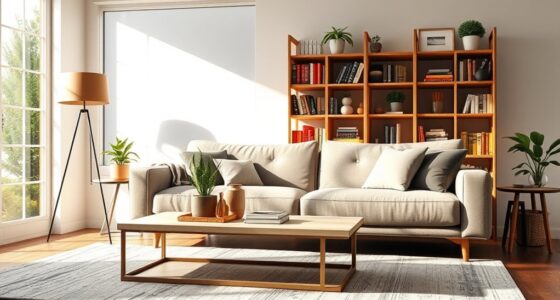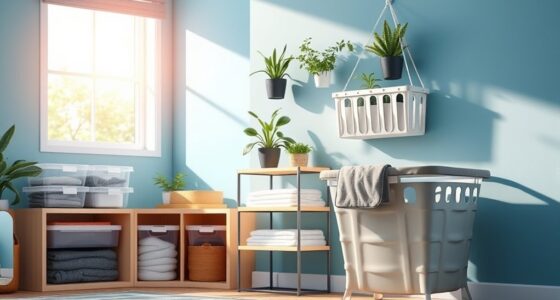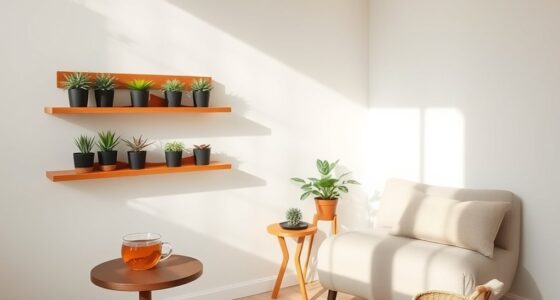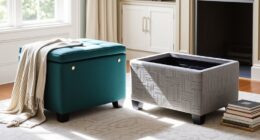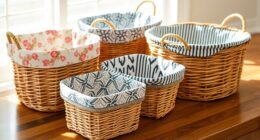To simplify your space as a minimalist beginner, I recommend five essential decluttering tools. Start with collapsible storage bins—they save space and can be easily tucked away. Use boxes or baskets for straightforward categorization of items. A journal helps track progress and set goals, making the process feel manageable. Prioritize multifunctional tools to maximize efficiency. Finally, consider repurposing household items for budget-friendly solutions. Stick around, and I'll share more insights on making your decluttering journey easier!
Key Takeaways
- Invest in collapsible storage bins to maximize space and easily store items when not in use.
- Use multifunctional boxes or baskets for efficient categorization and organization, simplifying your decluttering process.
- Track your progress with a journal to set goals and reflect on your decluttering journey.
- Repurpose existing household items like bags and newspapers as sorting tools to save money.
- Engage with digital decluttering using free software and apps to streamline your online space.
Blacksmithing for Beginners: 20 Secrets for Novices

If you're just starting your journey into blacksmithing, you're likely looking for clear, practical advice that won't overwhelm you. I found "Blacksmithing for Beginners: 20 Secrets for Novices" to be a mixed bag. While it offers some useful tips, much of the content felt redundant and basic—information I'd already picked up from shows like "Forged in Fire." Plus, the book lacks pictures, which could really help visual learners. At $22, I think it's overpriced; you could find similar tips online for free. Still, if you're new, some insights might spark your creativity as you begin this craft.
Best For: Beginners in blacksmithing seeking basic tips and guidance to start their craft.
Pros:
- Provides useful tips that may inspire creativity for novice blacksmiths.
- Aims to assist those new to the craft, reinforcing the importance of returning to basics.
- Well-written and easy to read, making it accessible for all skill levels.
Cons:
- Content may feel redundant and basic, lacking depth for those with prior knowledge.
- Overpriced at $22, with many similar resources available for free online.
- Absence of pictures can hinder understanding for visual learners.
Sustainable Minimalism: Zero Waste Living

Sustainable Minimalism: Zero Waste Living is ideal for those who want to simplify their lives while being mindful of their environmental impact. I've found that embracing minimalist habits not only declutters my space but also reduces waste. By focusing on quality over quantity, I've learned to cherish what I own. The book offers practical insights, guiding me through sustainable choices and decluttering techniques. While the writing can be a bit disjointed, the valuable advice shines through. If you're ready for a challenge, this resource can help you create a simpler, more authentic life while caring for our planet.
Best For: Individuals seeking to simplify their lives while adopting sustainable, zero waste practices.
Pros:
- Offers practical insights on decluttering and minimalist habits.
- Encourages thoughtful consumption, focusing on quality over quantity.
- Provides valuable guidance for those interested in sustainable living.
Cons:
- Writing style is disjointed and can be confusing.
- Sudden tense changes and run-on sentences disrupt the flow.
- Reading experience may be frustrating due to unclear transitions.
Decluttering at the Speed of Life: Winning Your Battle with Stuff

For anyone feeling overwhelmed by clutter and in need of practical solutions, "Decluttering at the Speed of Life" by Dana K. White is a game-changer. Dana's journey from clutter to clarity resonates with me; her relatable humor makes tackling messes feel achievable. The book's structure—building a decluttering mindset, room by room strategies, and tips for helping others—keeps it engaging. I love her focus on progress in short bursts; every little bit counts! While it may not explore deep into emotional attachments, it's perfect for anyone looking to simplify their space without the stress. Trust me, you'll feel inspired!
Best For: Individuals feeling overwhelmed by clutter who are seeking practical and straightforward decluttering solutions.
Pros:
- Engaging and relatable writing style that makes the decluttering process feel approachable and less daunting.
- Actionable strategies that allow for decluttering in short bursts, enabling visible progress without overwhelming the individual.
- Humor and compassion in the tone, which keeps readers motivated and inspired throughout their decluttering journey.
Cons:
- Limited exploration of deeper emotional issues related to clutter and consumerism, which some readers might find lacking.
- May not suit those seeking a more in-depth understanding of emotional attachments to belongings.
- Focus on practical tips means it may not address broader lifestyle changes needed for long-term decluttering success.
Keep the Memories, Lose the Stuff: Declutter and Downsize Guide

Many people find themselves overwhelmed by the sheer volume of possessions they've accumulated, especially during major life changes like moving or downsizing. "Keep the Memories, Lose the Stuff" by Matt Paxton is an invaluable resource for anyone traversing this emotional journey, particularly seniors or those tasked with sorting through a loved one's belongings. Paxton encourages us to create a Legacy List, capturing meaningful items and their stories. He offers practical tips, like dedicating just 10 minutes a night to declutter. By focusing on memories rather than physical items, we can simplify our lives and honor our past without the clutter.
Best For: Individuals, particularly seniors or those managing estate cleanups, who are overwhelmed by accumulated possessions and seek guidance on downsizing and decluttering.
Pros:
- Offers practical strategies for decluttering, making the process manageable and less overwhelming.
- Emphasizes the importance of preserving memories through a Legacy List, fostering emotional connections with meaningful items.
- Provides insights from the author's extensive experience, ensuring relatable and tested advice.
Cons:
- Some readers may find the focus on creating a Legacy List overshadowing specific decluttering methods.
- The emotional aspect of decluttering may not resonate with everyone, leading to varied engagement with the content.
- Limited guidance on handling specific types of items, which may leave some readers wanting more detailed strategies.
Tidy Spaces, Peaceful Mind: The Art of Decluttering
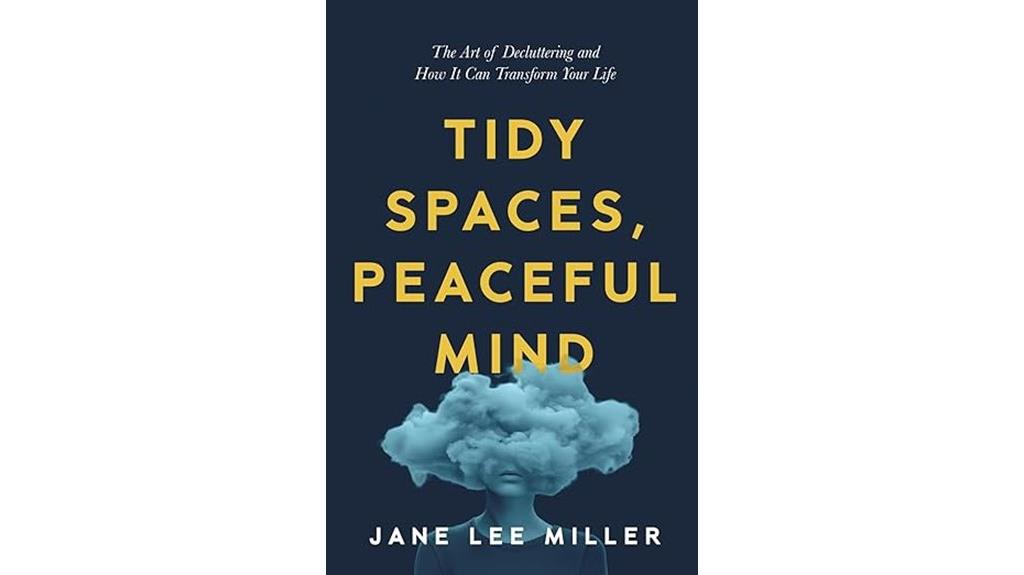
Decluttering can feel overwhelming, especially if you're just starting your minimalist journey. However, Jane Lee Miller's book "Tidy Spaces, Peaceful Mind" shows that decluttering isn't just about cleaning—it's a pathway to tranquility. By breaking tasks into smaller steps, like tackling a single drawer, I found it easier to manage. The psychological benefits are profound; a tidy space reduces stress and fosters mindfulness. Miller's casual style makes the process relatable and motivating. Embracing these strategies has empowered me to reclaim my environment, leading to a clearer mind and a more peaceful life. Let's simplify together!
Best For: Individuals seeking to declutter their physical and mental spaces for improved well-being and productivity.
Pros:
- Practical Strategies: Offers easy-to-follow steps for decluttering various areas of life.
- Psychological Benefits: Highlights the mental health improvements associated with a tidy environment.
- Motivational Style: Engaging writing style that makes the decluttering process feel relatable and achievable.
Cons:
- Repetitive Content: Some sections may feel redundant, which could dilute the impact of the advice.
- Limited Digital Focus: The book could benefit from more specifics on digital decluttering.
- Lack of Visual Aids: Inclusion of sample routines or visual tools would enhance practical application.
Factors to Consider When Choosing The Decluttering Tools for Minimalist Beginners

When I started my decluttering journey, I quickly realized that choosing the right tools is essential. I found it helpful to assess my needs, consider how versatile each tool is, and focus on simplicity. Plus, I wanted options that were durable, high-quality, and budget-friendly.
Assess Your Needs
How can you effectively choose the right tools for your decluttering journey? First, think about the types of items you need to tackle. Different tools work better for clothing, paperwork, or kitchenware. Next, assess your available space. If you have limited room, compact tools might be best, while larger ones suit more spacious areas. Consider your decluttering goals, too. Are you aiming for a complete overhaul or a gradual simplification? This will guide your tool selection. Also, reflect on your preferred decluttering style—whether you like a systematic approach or a more intuitive one. Finally, remember your emotional attachments. Tools that encourage reflection can help if you find it hard to let go of items.
Consider Tool Versatility
Choosing versatile tools can greatly enhance your decluttering experience, making it easier to maintain a minimalist lifestyle. I always prioritize items that serve multiple purposes, like boxes that work for both storage and sorting. This approach not only reduces the number of items I need but also maximizes functionality. I look for collapsible storage bins that I can easily tuck away when I'm not using them. Journals are another fantastic tool; they help track my progress and set goals, supporting both my physical and mental decluttering. It's also important to select tools that can evolve with my needs, allowing me to adjust my organization strategies as my minimalist journey unfolds. Versatility truly makes a difference!
Focus on Simplicity
Simplicity is key when selecting decluttering tools, especially for those just starting their minimalist journey. I've found that emphasizing simplicity helps me avoid overwhelm and focus on manageable tasks. It's crucial to choose tools that are multifunctional; this way, I can reduce clutter while efficiently organizing my space. Simple options like boxes or baskets allow me to categorize my belongings without complicating the process. I also appreciate tools that require minimal setup—this lets me implement my decluttering strategies quickly. By focusing on simplicity, I remind myself to let go of excess and prioritize what's truly essential. This approach aligns perfectly with the minimalist philosophy of living with less and helps me maintain a clutter-free environment.
Prioritize Durability and Quality
While I understand the temptation to grab the cheapest decluttering tools available, prioritizing durability and quality has made a significant difference in my minimalist journey. High-quality tools withstand regular use without breaking, saving me money in the long run. I've found that investing in well-made items not only reduces the need for frequent replacements but also enhances my decluttering experience. Quality tools often feature ergonomic designs, making the process more comfortable and efficient, especially for beginners like me. Plus, durable tools tend to include safety features, protecting me from injury when handling sharp or heavy items. Ultimately, choosing robust decluttering tools keeps me engaged in the process and reinforces my commitment to minimalism.
Budget-Friendly Options Available
Finding budget-friendly options for decluttering tools is essential for beginners like me who want to start their minimalist journey without breaking the bank. I've discovered that many tools are available for free or at a low cost. For instance, I can use boxes or bags I already have to sort items. Household items like old newspapers and towels also work well for organization. Thrift stores and community exchanges are gold mines for affordable storage solutions. Plus, I can tackle digital clutter with free software and apps, minimizing both physical and virtual messes. I've even found that local community groups share resources and tips, making it easier to learn effective decluttering strategies without spending a dime.
Research User-friendly Designs
As I explore budget-friendly options for decluttering tools, I soon realize that user-friendly designs play a significant role in making the process enjoyable and effective. I look for tools that prioritize ease of use, allowing me to engage without feeling overwhelmed. Intuitive layouts and clear labeling quickly show me where items belong, minimizing frustration. Lightweight and portable tools make moving things around a breeze, enabling me to work in various spaces. I'm also drawn to aesthetically pleasing designs; they motivate me to declutter more often. Finally, adjustable features let me customize my experience, enhancing usability and ensuring I find the right fit for my needs. These factors truly make a difference for beginners like me.
Frequently Asked Questions
What Are the Best Containers for Organizing Items During Decluttering?
When I tackle decluttering, I find that the best containers are clear bins and labeled boxes. Clear bins let me see what's inside, making it easy to find items later. I also love using stackable boxes; they save space and keep things organized. For smaller items, I use drawer dividers or small baskets. It's all about choosing containers that fit my space and help me maintain a clutter-free environment.
How Do I Choose the Right Donation Center for My Items?
Choosing the right donation center can feel overwhelming, but I've found a few tips that help. First, I consider the cause I care about, as it makes the donation feel more meaningful. Next, I check the center's location and hours to guarantee it's convenient for me. I also look into what items they accept, so I don't waste time. Finally, I read reviews to confirm they're reputable and trustworthy.
Can I Declutter Without Feeling Guilty About Getting Rid of Items?
Absolutely, you can declutter without guilt! I used to believe that every item held sentimental value, but I realized that memories aren't tied to things. Letting go of items can actually create space for new experiences and joy. When I focus on the freedom and clarity that decluttering brings, I feel empowered instead of guilty. Trust me, once you start, you'll see how liberating it is to lighten your load.
What Are the Benefits of Using Digital Tools for Decluttering?
Using digital tools for decluttering has transformed my approach. I love how apps help me track what I own, making it easier to identify duplicates or items I don't need. They also provide reminders and goals, keeping me motivated. Plus, I can organize photos and documents digitally, reducing physical clutter. It's like having a personal assistant that simplifies my space and my mind, allowing me to focus on what truly matters.
How Often Should I Revisit My Decluttering Process After Initial Efforts?
I believe revisiting your decluttering process is as essential as breathing! After your initial efforts, I usually check in every few months. Life changes, and so do our needs and habits. I find that setting a reminder every season helps me stay on track. It's a chance to reassess what I really need and let go of what I don't. Keeping my space light and airy is always my goal!
Conclusion
As I wrap up this journey into decluttering, I can't help but feel a surge of excitement for what lies ahead. With these essential tools in hand, you're just one step away from transforming your space and, ultimately, your mind. Imagine the freedom of a minimalist lifestyle, where every item serves a purpose. So, are you ready to take that leap and embrace a simpler life? Trust me, the rewards are waiting just around the corner.
